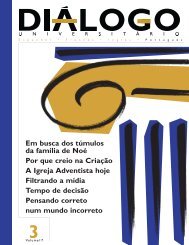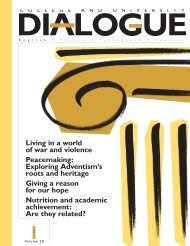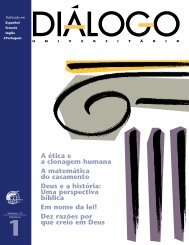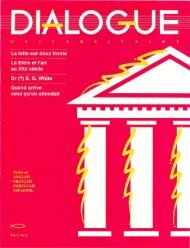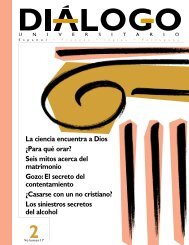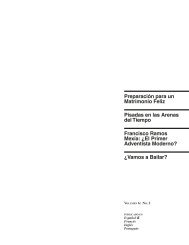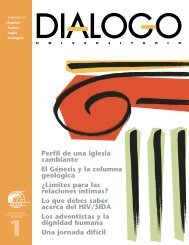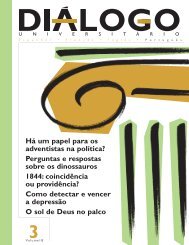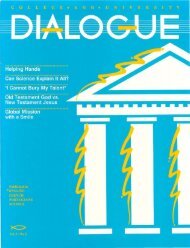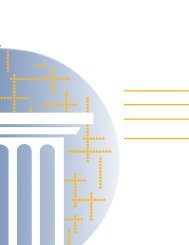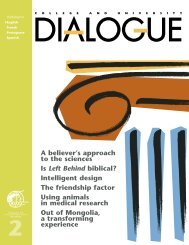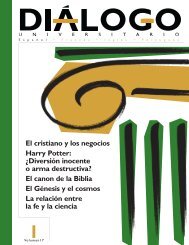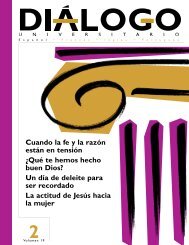Faith, reason, and the educated Christian Creationism - College and ...
Faith, reason, and the educated Christian Creationism - College and ...
Faith, reason, and the educated Christian Creationism - College and ...
Create successful ePaper yourself
Turn your PDF publications into a flip-book with our unique Google optimized e-Paper software.
quently leads to adjustments. True,<br />
many of <strong>the</strong> basic laws are universally<br />
accepted. But as scientists continue<br />
<strong>the</strong>ir research, <strong>the</strong>y take for granted that<br />
<strong>the</strong>ories <strong>and</strong> explanations that were accepted<br />
for years may be replaced by o<strong>the</strong>r<br />
<strong>the</strong>ories <strong>and</strong> interpretations that<br />
seem more accurate <strong>and</strong> reliable. 11 As a<br />
matter of method, scientists work in<br />
<strong>the</strong>ir disciplines within a naturalistic<br />
framework, which excludes <strong>the</strong> supernatural.<br />
Many of <strong>the</strong>m are agnostics or<br />
a<strong>the</strong>ists; however, <strong>the</strong>ir beliefs are not<br />
based on scientific evidence but on personal<br />
choice. Scientists who are open to<br />
<strong>the</strong> possibility that God exists, find in<br />
<strong>the</strong> natural world abundant evidence<br />
that <strong>the</strong>re is an Intelligent Designer who<br />
planned <strong>and</strong> sustains <strong>the</strong> universe <strong>and</strong><br />
life.<br />
5. Create a mental file for unresolved<br />
issues. Some questions will inevitably<br />
arise in our studies, in our life’s<br />
experience, <strong>and</strong> even in <strong>the</strong> Bible for<br />
which we don’t have satisfactory answers.<br />
In some cases, we find an explanation<br />
later. In o<strong>the</strong>r cases, questions<br />
remain unresolved. A classic example is<br />
<strong>the</strong> tension between our belief in an<br />
all-powerful, loving God <strong>and</strong> <strong>the</strong> suffering<br />
of <strong>the</strong> innocent. Although <strong>the</strong>re are<br />
abundant evidences of God’s power <strong>and</strong><br />
care, we cannot fully underst<strong>and</strong> why<br />
human tragedies <strong>and</strong> natural disasters<br />
occur in a universe in which He is sovereign.<br />
As o<strong>the</strong>r believers before us, we try<br />
to make sense of this <strong>and</strong> o<strong>the</strong>r deep<br />
mysteries. The best we can do with<br />
<strong>the</strong>se issues is to suspend judgment,<br />
keep studying <strong>the</strong>m prayerfully, <strong>and</strong><br />
seek <strong>the</strong> counsel of mature believers.<br />
Some day we will gain a new insight<br />
into <strong>the</strong> mystery or God will make <strong>the</strong>se<br />
contradictions clear to us. <strong>Faith</strong> in God<br />
<strong>and</strong> recognition of our own mental limitations<br />
dem<strong>and</strong> that we learn to live<br />
with some uncertainties <strong>and</strong> mysteries.<br />
Conclusion<br />
As a way of illustrating <strong>the</strong> main<br />
thrust of this essay, we can depict our<br />
Dialogue 15:3 2003<br />
mind as a court of law that operates every<br />
day of our lives, its integrity <strong>and</strong><br />
freedom protected by God Himself. 12 At<br />
court our individual will sits as <strong>the</strong><br />
judge, while <strong>reason</strong> <strong>and</strong> faith are <strong>the</strong><br />
lawyers that bring evidence to consider<br />
<strong>and</strong> witnesses to present <strong>the</strong>ir views.<br />
The evidence <strong>and</strong> <strong>the</strong> testimony <strong>the</strong>y<br />
provide comes from a wide variety of<br />
sources, which include: <strong>the</strong> influence of<br />
people we love <strong>and</strong> respect, <strong>the</strong> feeling<br />
of loving <strong>and</strong> being loved, our social interaction<br />
<strong>and</strong> dialogue with o<strong>the</strong>rs, observations<br />
of <strong>the</strong> natural world, spiritual<br />
experiences in prayer <strong>and</strong> service, readings<br />
<strong>and</strong> research, joys <strong>and</strong> sorrows of<br />
life, individual <strong>and</strong> collective worship,<br />
response to beauty in <strong>the</strong> arts, effect of<br />
our habits <strong>and</strong> lifestyle, <strong>and</strong> <strong>the</strong> search<br />
for inner consistency <strong>and</strong> au<strong>the</strong>nticity.<br />
Our will sifts daily through this multiplicity<br />
of emotional, spiritual, rational,<br />
<strong>and</strong> aes<strong>the</strong>tic perceptions <strong>and</strong> data,<br />
comparing <strong>the</strong>m with <strong>the</strong> code—our<br />
worldview. 13<br />
At times, <strong>the</strong> arguments advanced<br />
will be accepted <strong>and</strong> will streng<strong>the</strong>n our<br />
faith convictions. At o<strong>the</strong>r times, <strong>the</strong><br />
evidence presented will trigger an adjustment<br />
in our worldview <strong>and</strong> a modification<br />
of our beliefs. These changes, in<br />
turn, will have an impact on our conduct.<br />
O<strong>the</strong>r times, <strong>the</strong> will prefers not to<br />
decide. Sitting courteously in <strong>the</strong> background,<br />
<strong>the</strong> Holy Spirit is ready to speak<br />
a word of caution, correction, or affirmation.<br />
O<strong>the</strong>r voices, perhaps of uninvited<br />
observers, are also heard in <strong>the</strong><br />
courtroom, raising objections, presenting<br />
contrary evidence, <strong>and</strong> insinuating<br />
doubts. The court of our will continues<br />
to deliberate until <strong>the</strong> last day of our<br />
conscious life.<br />
As thoughtful <strong>Christian</strong>s, we are<br />
called to love God with both our mind<br />
<strong>and</strong> our will, integrating in our life <strong>the</strong><br />
dem<strong>and</strong>s of faith <strong>and</strong> intellect. For <strong>the</strong><br />
<strong>educated</strong> believer, <strong>the</strong>re is “no incompatibility<br />
between vital faith <strong>and</strong> deep,<br />
disciplined, wide-ranging learning, between<br />
piety <strong>and</strong> hard thinking, between<br />
<strong>the</strong> life of faith <strong>and</strong> <strong>the</strong> life of <strong>the</strong><br />
mind.” 14 In order to nurture <strong>the</strong>se three<br />
facets of our God-given abilities—faith,<br />
intellect, <strong>and</strong> will—we must deepen daily<br />
our friendship with God <strong>and</strong> our<br />
commitment to truth. He trusts that, in<br />
<strong>the</strong> face of <strong>the</strong> evidence available to us,<br />
we will be intelligent decision-makers. 15<br />
Humberto M. Rasi (Ph.D., Stanford University),<br />
recently retired from being <strong>the</strong> director<br />
of <strong>the</strong> General Conference Education<br />
Department, <strong>and</strong> continues to be <strong>the</strong> editorin-chief<br />
of Dialogue.<br />
Notes <strong>and</strong> references<br />
Unless o<strong>the</strong>rwise noted, all Bible passages in<br />
this essay are quoted from <strong>the</strong> New<br />
International Version.<br />
1. Ellen G. White, Education (Mountain<br />
View, Calif.: Pacific Press, 1952), p. 17.<br />
2. Ibid.<br />
3. In <strong>the</strong> same book, Ellen G. White defines<br />
faith crisply: “<strong>Faith</strong> is trusting God,<br />
believing that He loves us <strong>and</strong> knows best<br />
what is for our good” (p. 253).<br />
4. ”You believe that <strong>the</strong>re is one God. Good!<br />
Even <strong>the</strong> demons believe that—<strong>and</strong><br />
shudder” (James 2:19).<br />
5. See Hugo A. Meynell, “<strong>Faith</strong> <strong>and</strong> Reason”<br />
in The Encyclopedia of Modern <strong>Christian</strong><br />
Thought, edited by Alister E. McGrath<br />
(Oxford: Blackwell, 1993), pp. 214-219.<br />
6. Stephen Jay Gould, <strong>the</strong> recently deceased<br />
author <strong>and</strong> teacher of <strong>the</strong> history of<br />
science at Harvard University, declared<br />
that “<strong>the</strong> conflict between science <strong>and</strong><br />
religion exists only in people’s minds, not<br />
in <strong>the</strong> logic or proper utility of <strong>the</strong>se<br />
entirely different, <strong>and</strong> equally vital<br />
subjects.” In his view, “science tries to<br />
document <strong>the</strong> factual character of <strong>the</strong><br />
natural world, <strong>and</strong> to develop <strong>the</strong>ories<br />
that coordinate <strong>and</strong> explain <strong>the</strong>se facts.<br />
Religion, on <strong>the</strong> o<strong>the</strong>r h<strong>and</strong>, operates in<br />
<strong>the</strong> equally important, but utterly<br />
different, realm of human purposes,<br />
meanings, <strong>and</strong> values.” (Quoted in<br />
Houston Smith, Why Religion Matters<br />
[Harper San Francisco, 2001], pp. 70, 71).<br />
7. The Apostle Paul argues thus: “Indeed,<br />
when Gentiles, who do not have <strong>the</strong> law,<br />
do by nature things required by <strong>the</strong> law,<br />
<strong>the</strong>y are a law for <strong>the</strong>mselves, even<br />
though <strong>the</strong>y do no have <strong>the</strong> law, since<br />
<strong>the</strong>y show that <strong>the</strong> requirements of <strong>the</strong><br />
law are written on <strong>the</strong>ir hearts, <strong>the</strong>ir<br />
consciences also bearing witness <strong>and</strong> <strong>the</strong>ir<br />
thoughts now accusing, now even<br />
defending <strong>the</strong>m” (Romans 2:14, 15).<br />
Continued on page 16.<br />
9



